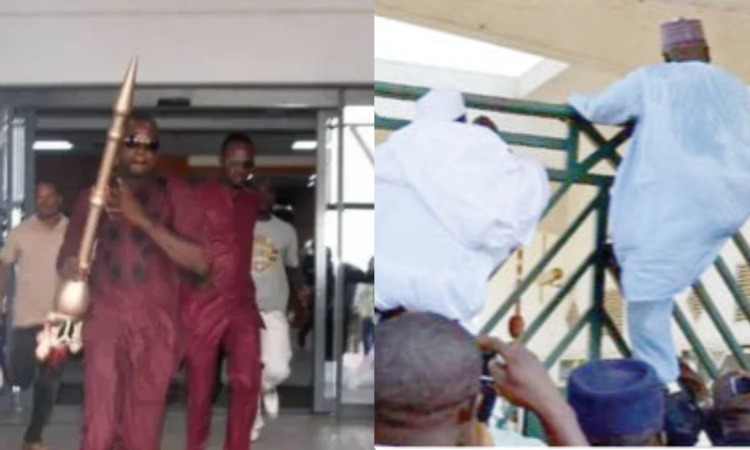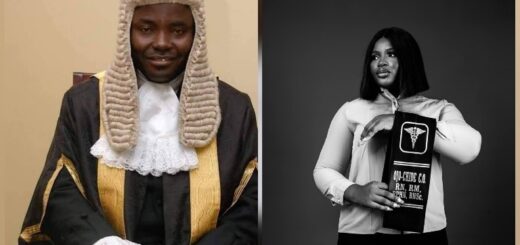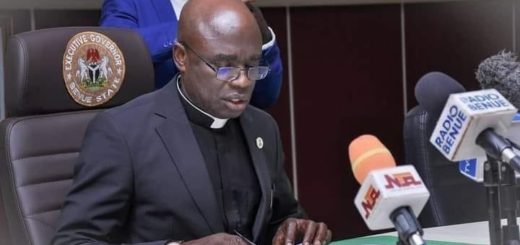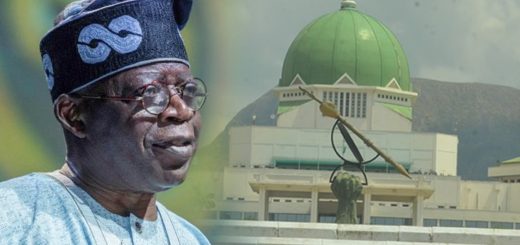From Mace Theft To Riot At National Assembly – Notable Scandals That Have Rocked Nigeria’s Democratic Journey Since 1999
 Nigeria finally embraced democratic governance on May 29, 1999, after enduring years of arrests, imprisonment, and assassinations of pro-democracy activists under military rule.
Nigeria finally embraced democratic governance on May 29, 1999, after enduring years of arrests, imprisonment, and assassinations of pro-democracy activists under military rule.
This transition, which drove the military back to the barracks and marked a new beginning, is typically known as Nigeria’s fourth republic.
This period has been the longest stretch of civilian rule without military interference since Nigeria gained independence in 1960.
Despite facing challenges, the trajectory of Nigeria’s democracy has weathered controversies through the sheer will of its citizens to fortify their young democratic system.
Below are some of the significant scandals that have shaken the democratic journey since 1999:
Salisu Buhari and His Toronto Certificate
The scandal involving Ibrahim Salisu Buhari, the newly appointed Speaker of the House of Representatives in 1999, remains one of the most audacious and blatant cases of misconduct by a political figure in Nigeria’s recent history.
Buhari, hailing from Kano State, was found to have falsified not only his age but also his academic qualifications, causing a major uproar within the Green Chamber. An investigation by The News Magazine uncovered that Buhari claimed to have earned a Bachelor of Science in Business Administration from the University of Toronto, Canada, in 1990, along with a diploma in accountancy from Ahmadu Bello University (ABU), Zaria, in 1988.
Additionally, he purportedly served in the National Youth Service Corps (NYSC) in 1991. However, it was later revealed that Buhari was born on January 3, 1970, making him 29 years old at the time of his election, below the constitutionally mandated age limit of 30.
Furthermore, records showed that he never attended the University of Toronto or participated in the NYSC program.
Despite initially refuting the accusations, pressure mounted as the federal government indicated plans to prosecute him. Ultimately, on July 22, 1999, just 49 days after his election, Buhari resigned from his position as Speaker and member of the House of Representatives.
Obasanjo’s Third-Term Political Ambition
The contemplation of a third term for President Olusegun Obasanjo during the final stretch of his second presidential term sparked turmoil in Nigeria’s political landscape, prompting widespread concern about the sanctity of the country’s democracy.
Although Obasanjo himself denied harboring any desire for an extended tenure, the episode underscored the determination of Nigerians to safeguard the hard-won democratic gains.
Ken Nnamani, then-Senate President in 2006, revealed during the launch of his book, “Standing Strong: Legislative Reforms, Third Term, and Other Issues of the 5th Senate,” that the adjournment of the Senate amid the constitutional amendment process prompted a shift in sentiment among senators supportive of the bill, following interactions with their constituents.
He further noted that the televised proceedings on May 16, 2006, which deliberated the amendment to allow for three presidential terms, compelled certain senators to withdraw their backing for the proposal.
Years later, allegations of lawmakers receiving cash in “Ghana-must-go” bags to endorse the bill continued to cast a shadow over the integrity of the National Assembly.
2007 Presidential Election
The aftermath of Obasanjo’s failed third-term bid saw the 2007 presidential election, widely regarded as Nigeria’s most troubled electoral process to date, culminating in the ascension of late Umaru Musa Ya’ardua to the presidency.
The election drew scathing criticism from European Union observers, who branded it as the “worst they had ever seen anywhere in the world,” citing rampant vote rigging, violence, ballot box theft, and intimidation as rampant.
INEC’s inadequate planning exacerbated the chaos, with voting starting as late as 5 p.m. in some regions due to delayed material arrivals on election day.
In a prelude to the election, INEC initially omitted the name of Obasanjo’s contentious Vice President, Atiku Abubakar, from the list of presidential candidates, a decision overturned by the Supreme Court a mere week before the polls.
Post-election, Ya’ardua acknowledged the flawed process and pledged to enact legislation aimed at fortifying the electoral system.
Controversy Surrounds Jonathan’s Role During Yar’adua’s Absence
Perhaps one of the most challenging periods in Nigeria’s democratic journey was when then President Umaru Musa Ya’ardua took ill and was flown to Saudi Arabia for treatment without formally handing over to his deputy as envisaged by the constitution.
His absence in the country for 10 weeks stalled governance, which prompted the National Assembly to make his vice president, Goodluck Jonathan, the acting president, a move that was opposed by members of Yar’adua’s cabinet.
The act was termed by the then Senate President, David Mark, as the “doctrine of necessity due to a lack of constitutional precedent.”
Before the solution by the National Assembly, the polity had been heated up along both religious and ethnic lines, with many from the southern part of the country where Jonathan comes, interpreting the power play as a strategic agenda to deny the South-South the opportunity to govern the country.
Corruption Allegations Rock Patricia Etteh’s Speakership
On June 6, 2007, Patricia Etteh became Nigeria’s first female Speaker of the House of Representatives. But the trained hairdresser and beauty therapist, who later became a lawyer, had one of the shortest tenures as the number four citizen of Nigeria.
Two months after her emergence, accusations of corruption were raised against her. She was made to face an ad hoc committee over accusations that she had authorised the spending of N628 million on renovations of her official residence and that of her deputy, and the purchase of 12 official cars meant for the House of Representatives.
During one of the committee’s sittings where she had appeared to defend herself, chants of ‘Thief!’ ‘Thief!” in Yoruba were directed at her, with the session degenerating into a commotion with the lawmakers descending into a free for all.
She was eventually escorted out by the security men, and on October 30, 2007, after weeks of pressure, she resigned. Her deputy, Babangida Nguroje, also resigned.
Farouk Lawan Convicted for Bribery in Fuel Subsidy Probe
In 2012, the House of Representatives’ ad hoc committee investigated petroleum product subsidies, discovering that the government had overpaid some markers by N229.7 billion between 2010 and 2011.
Faruk Lawan, the committee’s chairman, known for his integrity, submitted the report, identifying companies alleged to have defrauded the government. However, days later, he was embroiled in a bribery scandal.
A video surfaced showing him accepting and concealing wads of dollar notes in his cap, supposedly as a bribe from one of the marketers.
Nearly a decade later, Justice Angela Otaluka of the FCT High Court convicted him, sentencing him to seven years in prison for receiving a $500,000 bribe while chairing the committee.
The court found that Lawan demanded $3 million and accepted $500,000 from Femi Otedola, a Nigerian billionaire oil mogul, in 2012.
He took the bribe to exclude Otedola’s company, Zenon Oil and Gas, from the list of firms implicated in subsidy fraud. His sentence was later reduced to five years by the Supreme Court.
Occupy Nigeria: Nationwide Protest Erupts Over Fuel Subsidy Removal
In January 2012, Nigerians took to the streets in a nationwide protest against the government’s decision to remove fuel subsidy, causing a significant increase in fuel prices from N65 to N141 per litre.
The Occupy Nigeria movement, which commenced on January 2, 2012, resulted in widespread strikes across the country, with both government and private sector workers joining the protest, nearly paralyzing the nation’s economy.
Amidst the political backdrop, opposition parties capitalized on the protests, while ordinary citizens used the platform to express frustration over escalating living costs and endemic corruption.
In response to mounting pressure, the government eventually reduced the fuel price to N97, succumbing to the demands of the protesting masses.
Orubebe’s Infamous Disruption of 2015 Election Collation
The 2015 election that brought popular opposition figure Muhammadu Buhari to power remains one of the most intriguing in Nigeria’s history, especially at the anti-climax that was witnessed at the collation centre.
While the election was adjudged one of the best and the incumbent conceded defeat even before the official declaration of Buhari as the winner, a former minister of Niger Delta Affairs and representative of President Goodluck Jonathan, Godsday Orubebe, disrupted the collation while making some allegations against the then INEC chairman, Prof. Attahiru Jega, when the former realised his principal would lose the election.
While Jega kept his cool during the drama, the antics of Orubebe, expected to stop the final declaration, will forever be etched in the minds of Nigerians.
Riot Erupts at National Assembly as Speaker Tambuwal Defects
Amidst the defection of then Speaker Aminu Tambuwal to the main opposition party, security personnel prevented his entry into the National Assembly, sparking uproar within the legislative arm.
Tensions escalated as lawmakers clashed with police officers, who deployed tear gas to deter their access to the complex. With entrances barricaded, some legislators resorted to scaling fences while others forcefully opened pedestrian gates, allowing Tambuwal eventual entry into the premises.
Security Operatives Raid Senate President and Deputy’s Residences
In 2018, security forces launched aggressive actions targeting key figures in the legislative branch, particularly Senate President Bukola Saraki and his deputy, Ike Ekweremadu, amidst political tension and allegations.
The first incident saw DSS operatives storming Saraki’s residence, seeking his arrest based on alleged connections to the Offa robbery incident. Simultaneously, EFCC officials barricaded Ekweremadu’s house over suspicions of money laundering.
While Saraki evaded arrest, Ekweremadu faced the consequences. These actions were seen as retaliation for their planned defection from the ruling party.
Furthermore, the National Assembly complex faced a DSS siege in August, aimed at obstructing lawmakers’ entry following Saraki’s defection.
The fallout led to the dismissal of the DSS Director General.
Senate Mace Theft Drama Unfolds
In 2018, chaos erupted in the Senate as thugs stormed the red chambers, stealing the mace. While suspicion fell on Senator Ovie Omo-Agege, who was present despite his suspension, he denied any involvement in the incident.
The police later found the mace at the City Gate, leading to Omo-Agege’s arrest. However, he was subsequently released, eventually rising to become the Deputy Senate President in the 9th Assembly.













